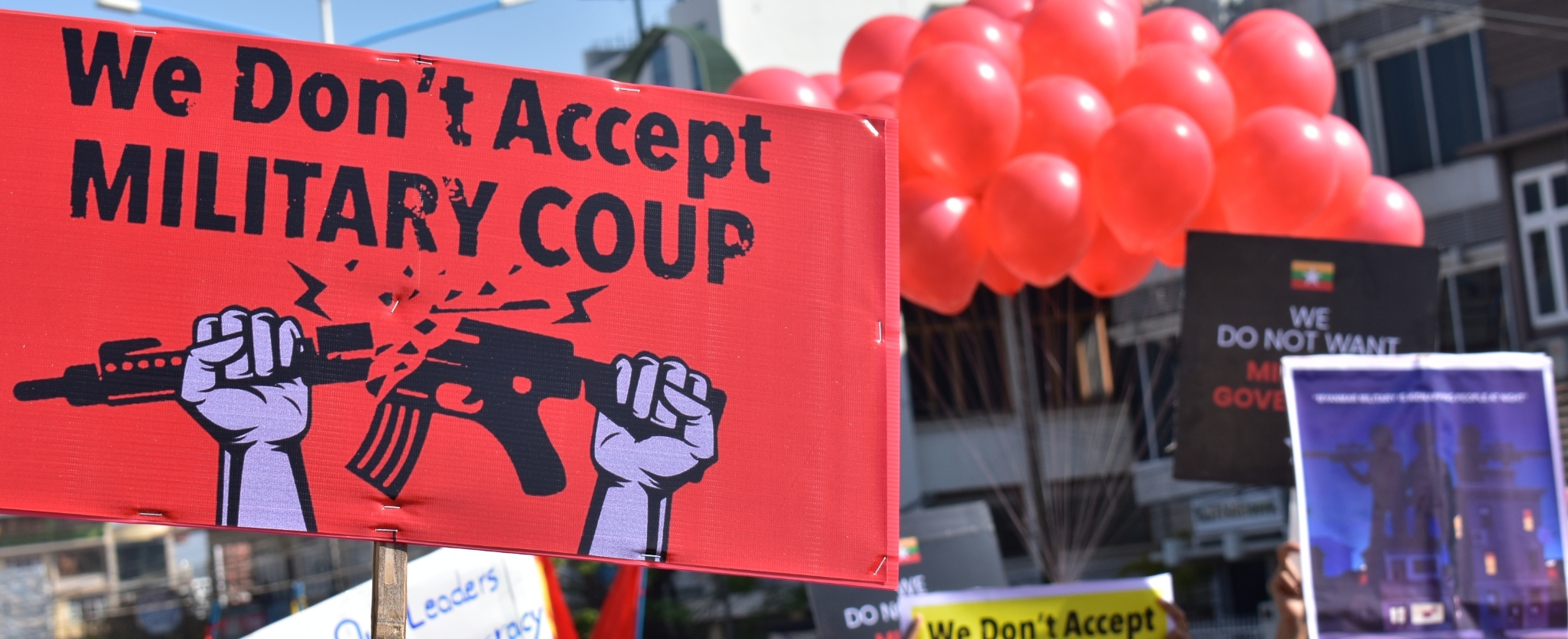
05 Jul Assessing Myanmar Market Since the Coup
Myanmar’s military seized power in the country on 1 February 2021, after detaining Aung San Suu Kyi and other democratically elected leaders. The fears of a military coup had been simmering in the Southeast Asian nation since the military disputed the results of the November 2020 election. Suu Kyi’s NLD won in a landslide victory that month, capturing 396 out of 476 seats, allowing the party to form a government for five more years. The military- backed Union Solidarity and Development Party had won just 33 seats.
In February 2021, the military overthrew the elected government and declared a one-year state of emergency, defending their actions by alleging election fraud by NLD. However, International observers on 17 May 2021 rejected the claim, which the military has used as justification for its coup.
“There is no concrete or solid evidence that there was massive fraud that undermined the elections as claimed by the Myanmar military. It is ANFREL’s informed opinion that the results of the 2020 general elections were, by and large, representative of the will of the people of Myanmar,” said observer Chung Lun during a presentation via videoconference of the final report on the Myanmar elections by members of the Asian Network for Free Elections (ANFREL).
Internal matters
Myanmar is on the path to a nationwide civil war unless there is a coordinated response from all parties concerned, according to experts. Since February’s coup, Myanmar’s population have opposed the coup, with street protests and strikes against the military. In response, the armed forces have detained thousands of protesters and bystanders, many of whom have been killed. As of 3rd June, 845 people are now confirmed killed by the military junta, a total of 4509 people are currently under detention; of them 96 are sentenced.
Deposed Myanmar leader Aung San Suu Kyi voiced defiance as she made her first court appearance late May, since the military detained her in the coup, vowing her political party would live on. She said her ousted party would “exist as long as the people exist”.
The National Unity Government (NUG) is a body claiming to be the legitimate government of Myanmar, existing along with State Administration Council military junta. The NUG was formed following the coup. The structure of the NUG was formally announced by the Committee Representing Pyidaungsu Hluttaw (CRPH) on 16 April 2021. The cabinet includes lawmakers elected in the 2020 election, members of the ethnic groups and key figures in the anti-coup protest, almost all of whom are in hiding or in exile. The military junta has declared the NUG to be illegal.
The NUG has sought international recognition as the government of Myanmar, and when the NUG was announced its designated minister for home affairs and immigration Minister Lwin Ko Latt, stated that he expects recognition by several countries soon. The International Trade Union Confederation has called for NUG announced the formation of “People Defense Force” as its armed wing to launch an armed revolution against the military junta, which designated it a terrorist organization three days later 8 May 2021.
International community response
The UN special envoy for Myanmar, Christine Schraner Burgener, has warned ASEAN of its inertia over the coup matter and mentioned that time was running out in getting the country’s junta to comply with the five-point consensus plan drawn up in April. She is calling for an “inclusive” dialogue involving all stakeholders to quickly end the violence in the country.
U.S., UK and EU authorities continue to expand sanctions targeting the Tatmadaw, Myanmar’s armed forces. Over the past month, the US and its European allies have imposed blockades and other sanctions on (a) the two major Tatmadaw-controlled conglomerates, Myanmar Economic Holdings Public Company Limited (MEHL or MEHPCL) and Myanmar Economic Corporation Limited (MEC) that provide financing for the armed forces) additionally on gem, pearl and timber industry companies that provide sources of funding to the regime; and (c) regime on Tatmadaw officials. Australia has imposed sanctions and travel bans on five members of the Myanmar military since the coup.
Foreign Investment
There has been no new foreign investment during the month of April 2021, according to the data issued by the Directorate of Investment and Company Administration (DICA).
According to the state-run media, Singapore, China and Thailand continue to be the three largest investors out of 51 countries. As per the Economist’ reports, some 90% of the total stock of foreign investment in Myanmar comes from other Asian countries. EIU suggests that ASEAN may not be as invested and are likely to roll back investment.
Myanmar’s economy and banking system have been hardly scraping by since the destabilizing military coup. The World Bank has forecast the Myanmar economy to contract by 10 percent this year as a result of post-coup turmoil, and estimated that 600,000 people have lost their jobs since the takeover.
United Nations agencies have warned of impending food shortages and increased poverty if the crisis continues, in addition to the threat of COVID-19 pandemic, which is far from over. According to MCRB, the survey undertaken in April by ten Chambers of Commerce demonstrated very clearly the massive economic impact of the coup on the Myanmar economy and employment and showed this to be far more significant than COVID-19. Foreign investors, expectedly, are shying away from the once young and booming economy.
- Telenor, the Norwegian telecom company, this month wrote off the full US $782 million value of its Myanmar business, but said it had no plans to quit the country. A report by the International Crisis Group says Myanmar’s military rulers are seeking to limit access to the internet to only “whitelisted” sites to quash widespread opposition to their seizure of power. Telenor and other businesses have protested the move, which they say are crippling business activity and have undone years of progress toward integrating Myanmar into the world economy.
- Total has announced the suspension of dividend payments for the Moattama Gas Transportation Company (MGTC), effective from 1st April 2021 and all cash distributions by MGTC to its shareholders are suspended, which is a source of financing for Myanmar’s military junta and accounts for a small fraction of total payments from the Yadana project. According to projections published by the Ministry of Planning and Finance, the Myanmar state earns around US $1.5 billion annually from all offshore oil and gas projects. MGTC’s suspension of dividends accounts for a small proportion of that. Justice for Myanmar reiterates calls for the immediate sanctioning of Myanmar Oil and Gas Enterprise, the national oil and gas company of the country.
- Aeon Mall, a developer of shopping malls under major Japanese retailor Aeon, has postponed construction of a mall being planned in Myanmar’s largest city Yangon, according to a source familiar with the project.
- Ayala-led firm, AC Energy Corporation indicated that it is temporarily slowing down on its’ renewable energy ventures due to give the worsening civil strife tearing down Myanmar.
- Kirin, parent company of Australian beer company Lion, cuts ties with Myanmar military after coup.
- The garment sector, a major contributor to the country’s economy and a key source of export earnings, has been critically affected. Several foreign brands have halted their orders and most operations are at a standstill.
Looking ahead
The military junta has been looking to keep investment and economic activity rolling. 15 new projects including those in electricity generation, livestock, manufacturing and other services sectors and capital of two existing projects were approved by the Myanmar Investment Commission with investment capital of over US $2.7 billion, recently.
But as international commentators note, this maybe too little too late. Currently, the confidence on Myanmar as an investment destination is too low and is unlikely to change unless situation normalizes.
